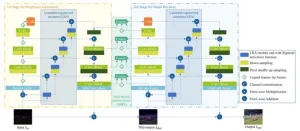(Press-News.org) The neurons of the brain are protected by an insulating layer called myelin. In certain diseases like multiple sclerosis, this protective layer is damaged and lost, leading to death of neurons and disability. New research published in The FEBS Journal reveals the importance of a protein called C1QL1 for promoting the replacement of the specialized cells that produce myelin. The findings could have important implications for the ongoing effort to develop new and improved therapies for the treatment of demyelinating diseases.
In experiments conducted in mice, deleting the gene that codes for C1QL1 caused a delay in the rate at which oligodendrocytes (the cells that make myelin) mature, leading to reduced myelination of neurons.
After mice were fed a drug that destroys myelin, recovery of oligodendrocytes and myelination were delayed in mice lacking the C1QL1 protein. Causing mice to express more C1QL1, however, led to increased numbers of oligodendrocytes and more myelination upon drug withdrawal, suggesting that C1QL1 helps to restore the damaged myelin layer. Thus, investigational therapies that boost C1QL1 may hold promise against demyelinating diseases.
“Our basic research on C1QL1 is nascent, but there is potential that it is relevant for a novel treatment for multiple sclerosis,” said corresponding author David C. Martinelli, PhD, of the University of Connecticut Health Center. “New drug treatment options for patients with multiple sclerosis could have a large impact on their quality of life.”
URL upon publication: https://onlinelibrary.wiley.com/doi/10.1111/febs.17256
Additional Information
NOTE: The information contained in this release is protected by copyright. Please include journal attribution in all coverage. For more information or to obtain a PDF of any study, please contact: Sara Henning-Stout, newsroom@wiley.com.
About the Journal
The FEBS Journal is a multidisciplinary, non-profit society journal that publishes full-length high-quality papers and expert reviews relevant to the molecular, cellular and biochemical life sciences.
About Wiley
Wiley is a knowledge company and a global leader in research, publishing, and knowledge solutions. Dedicated to the creation and application of knowledge, Wiley serves the world’s researchers, learners, innovators, and leaders, helping them achieve their goals and solve the world's most important challenges. For more than two centuries, Wiley has been delivering on its timeless mission to unlock human potential. Visit us at Wiley.com. Follow us on Facebook, X, LinkedIn and Instagram.
END
New research provides insights into how the brain regenerates lost myelin
2024-09-11
ELSE PRESS RELEASES FROM THIS DATE:
Cells that die during inflammation send wound-healing messages
2024-09-11
Cells that die during inflammation send wound-healing messages
A study by the team of Prof. Kodi Ravichandran (VIB-UGent Center for Inflammation Research) and colleagues found that pyroptosis, a form of programmed cell death traditionally thought to be purely inflammatory, also plays a crucial role in promoting healing and tissue repair. This research, published in Nature, opens new avenues for understanding how our bodies respond to injury and could lead to innovative treatments for wounds and inflammatory diseases.
Dying cells
About a billion cells ...
Risk of secondary cancers after CAR T therapy may be similar to risk after other cancer treatments
2024-09-11
Bottom Line: The frequency of second primary malignancies (SPMs) arising in cancer survivors following treatment with CAR T-cell therapy was statistically comparable to the frequency of SPMs following other standard-of-care therapies, according to a systematic review and meta-analysis.
Journal in Which the Study was Published: Clinical Cancer Research, a journal of the American Association for Cancer Research (AACR)
Author: Kai Rejeski, MD, a visiting investigator and research fellow in the Adult Bone Marrow Transplant Service at Memorial Sloan Kettering Cancer Center.
Background: In January 2024, the U.S. Food and ...
Enhance and revise for better low-light image enhancement
2024-09-11
With the development of intelligent era, information captured in low-light environments has become increasingly vital. Low-light enhancement technology is now a significant research topic in the domain of machine vision. Designing a robust low-light enhancement algorithm can not only improve the contrast of images, but also restore color and texture details, so as to obtain more distinct and accurate low-light scene information.
The team led by Prof. Danhua Cao from Huazhong University of Science and Technology (HUST), ...
Multiple ways to evolve tiny knee bone could have helped humans walk upright
2024-09-11
The evolution of bones in primates’ knees could have implications for how humans evolved to walk upright, a new study has found.
Researchers from King’s College London analysed the presence of the lateral fabella, a bone in the knee the size of a sesame seed, in 93 different species of primates.
They found that while most primates have these bones, they are often absent in hominoids, the group of primates that humans belong to alongside chimpanzees, gorillas, gibbons, and others.
Yet ...
UBCO study explores access to psychedelics for therapeutic use
2024-09-10
Feeling safe and comfortable are key when discussing your health and wellbeing with your primary care provider.
However, that feeling of comfort and safety can’t be taken for granted among many people who have turned to psychedelic substances—including psilocybin—to help control their symptoms of depression, anxiety or PTSD. Now, a team of UBC Okanagan researchers in the Irving K. Barber Faculty of Arts and Social Sciences has published a study looking into patient perspectives and potential issues when it comes to discussing psychedelics for therapeutic use with their physicians.
Dr. Michelle St. Pierre conducts ...
Lower diligence level linked to higher cardiovascular disease risk in type 2 diabetes
2024-09-10
People with type 2 diabetes, who display lower levels of diligence, may have a significantly higher risk of developing cardiovascular disease with which diabetes is strongly associated, finds research published in the open access journal BMJ Open Diabetes Research & Care.
While certain personality traits may influence cardiovascular disease risk, adopting a healthy lifestyle is still beneficial, irrespective of diligence level, the findings show.
Effective management of type 2 diabetes ...
Statins cost effective and linked to better health outcomes in older people
2024-09-10
Statin treatment is cost effective and linked to better health outcomes in older people with or without previous cardiovascular disease, although the risk reductions were substantially smaller in the latter, reports a modelling on the lifetime benefits of these drugs among the over-70s, published online in the journal Heart.
The findings back consideration of these drugs for most over-70s, say the researchers.
Statins are used extensively to ward off heart attacks and strokes in middle-aged people, ...
Abdominal fat linked to widespread chronic pain, especially in women
2024-09-10
Excess abdominal fat is associated with widespread chronic pain, particularly in women, finds the first study of its kind, published in the open access journal Regional Anesthesia & Pain Medicine.
Reducing excess fat deposits in the abdomen may help reduce chronic musculoskeletal pain, especially if it’s experienced at multiple body sites, suggest the researchers.
Previously published research has shown that obesity is associated with musculoskeletal pain, but it’s not known if excess fat tissue is linked to chronic musculoskeletal pain and at multiple body sites, ...
Wearable brain imaging device shines a light on how babies respond in real-world situations
2024-09-10
A new technology which uses harmless light waves to measure activity in babies’ brains has provided the most complete picture to date of brain functions like hearing, vision and cognitive processing outside a conventional, restrictive brain scanner, in a new study led by researchers at UCL and Birkbeck.
The wearable brain imaging headgear, which was developed in collaboration with UCL spin-out Gowerlabs, found unexpected activity in the prefrontal cortex, an area of the brain that processes emotions, in response to social stimuli, appearing to confirm ...
"Cuddle hormone" oxytocin may provide pain relief and help curb harmful opioid use
2024-09-10
In the midst of America’s growing opioid crisis, a much healthier alternative to long-term pain management is emerging — one affectionately known as “the cuddle hormone,” or oxytocin.
University of Florida researchers are currently investigating whether a synthetic version of this naturally-occurring human hormone can be used in conjunction with prescription drugs to help curb opioid addictions, especially in susceptible older adults. An interdisciplinary research team is conducting the two-year study, with $414,375 in funding from the National ...


